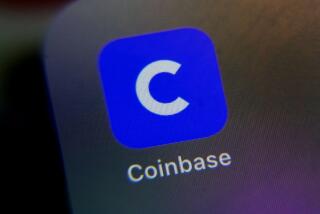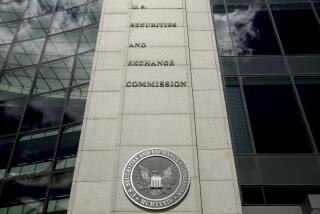CBOE Is Censured for Not Enforcing Its Trading Rules
- Share via
WASHINGTON — The Chicago Board Options Exchange, the world’s largest stock options market, was censured by securities regulators Thursday for failing to enforce its own trading rules when its members were charged with manipulating the market.
The Securities and Exchange Commission said a group of CBOE members, including then-CBOE Vice Chairman Gary Lahey, allegedly traded among themselves to artificially boost volume when certain stock options were introduced in 1985.
CBOE voluntarily settled the case without admitting or denying the charges. The case is the third brought against a U.S. exchange since 1975.
The Chicago exchange faced tough competition for options business from its nearest rival, the American Stock Exchange, at the time of the alleged violations.
“I think competition was a factor in the whole episode,” said Mark Fitterman, associate director of the SEC’s division of market regulation.
The case is not linked to ongoing investigations by other agencies into alleged fraudulent trading on the Chicago Board of Trade and the Chicago Mercantile Exchange, Fitterman said.
Under an order of settlement reached with the SEC, CBOE has agreed to increase its surveillance of trading, periodically remind its members that trading conducted to artificially increase volume or affect price violates exchange rules, and revise its disciplinary procedures.
“The exchange had already completed all undertakings called for in the order prior to the order being entered,” CBOE said in a statement.
The alleged market manipulation occurred when the Chicago exchange was promoting its new options for over-the-counter stocks. These options were listed on other exchanges around the country as well.
CBOE also was launching its now-defunct options product called the Standard & Poor’s 250 index. This option is based on an underlying basket of 250 stocks traded in the over-the-counter market.
A stock option is a contract granting the holder the right, but not the obligation, to buy or sell a specified number of shares at a set price by a certain date.
Risk-Free Positions Created
CBOE’s staff in 1986 presented evidence to the exchange’s regulatory board, called the Business Conduct Committee, that 12 market makers and seven affiliated firms were involved in a practice called “chumming.”
Under this practice, market makers created risk-free positions by agreeing to buy and sell options from each other, sometimes over several days, the SEC said. This created a false perception of market activity, it said.
“If all you do is trade back and forth with each other, then all you do is create a bunch of trades and haven’t done anything to create volume,” said Fitterman.
The CBOE staff accumulated compelling circumstantial evidence of market manipulation, but the regulatory committee decided that there was no probable cause to charge its members and did not hold formal hearings, the SEC said.
“If this type of trading is a crime, it’s a victimless crime,” one CBOE member said during a committee meeting, according to the order.
The committee’s failure to enforce its own rules without a justifiable excuse amounted to a violation of the 1934 Securities and Exchange Act, the SEC said.
Names of the market makers and the firms were not released, and the SEC said no further actions are planned against them. Lahey, the former CBOE vice chairman, continues to trade on the exchange, Fitterman said.
Volume on the CBOE in April was 9.6 million contracts, up 4% from year-ago levels. It offers option contracts on 200 widely traded stocks and on two stock indexes.
Other cases brought by the SEC were in 1980 against the Philadelphia Stock Exchange for failure to enforce quote rules and the Boston Stock Exchange for parking stock, a technique that hides the shares’ true owners.
More to Read
Inside the business of entertainment
The Wide Shot brings you news, analysis and insights on everything from streaming wars to production — and what it all means for the future.
You may occasionally receive promotional content from the Los Angeles Times.









